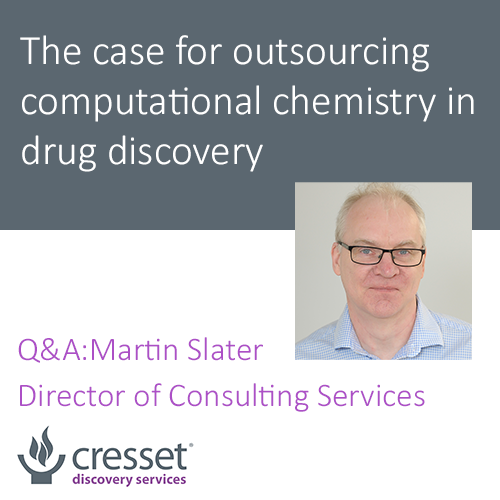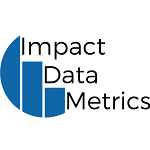The case for outsourcing computational chemistry in drug discovery

Dr Martin Slater, Director of Consulting Services, explains why outsourcing computational chemistry could be the key to maximizing ROI in pharmaceutical research.
Why are computational methods so powerful in drug discovery?
They can predict the physical properties and biological activity of compounds prior to synthesis and analysis, saving significant time and money by removing unnecessary wet chemistry. R&D efficiency has been a long-term challenge in the pharmaceutical industry and has resulted in staggeringly high costs to develop and launch new therapeutics. Computational chemistry has the power to improve this by predicting the likelihood of compound failure and allowing companies to prioritize the right candidates.
Computational methods have the potential to provide faster and more innovative solutions than traditional experimental techniques, but rely on the accuracy of their algorithms to provide reliable results. The methods that are currently used can fall short of the accuracy that would completely revolutionize the drug discovery landscape and hence, on these occasions, wet chemistry has to take over. However, novel computational methods such as those developed by Cresset are making a significant impact on the discovery process.
Are there any areas where computational methods been particularly successful?
Virtual screening is a powerful technique that enables scientists to process millions of molecules against a known target. It is an effective method for exploring new chemical space and generating novel, diverse and patentable lead hits. It’s far more cost effective than wet high-throughput screening.
Computational methods have also started to be applied in compound reprofiling or repurposing, which allows for the use of existing molecules in a new area, lowering the costs and risks of development. Computational chemistry allows the re-profiling to be done in a low-cost and rational way, leading to major cost and time advantages.
Why should companies consider outsourcing their computational chemistry?
As with all other scientific tools, computational chemistry requires intelligent input to develop the right methods and interpret the results to get maximum output. Outsourcing computational chemistry to a specialist service provider like Cresset Discovery Services brings expert scientific knowledge, experience and sophisticated methods to a project. Outsourcing can prove to be a very cost-effective option as it eliminates the expenses of hiring and training an in-house team that may not be put to use full-time.
Why do you think we’ve seen an increasing trend in outsourcing computational chemistry?
We’ve seen an increased trend in computational chemistry as a whole. It has become a more integral and accepted part of pharmaceutical research, as the industry has recognized its scientific value.
In terms of outsourcing, the increased fragmentation of the pharmaceutical industry has brought a higher number of companies that can move quickly to offer tailored research, often through the use of on-demand services from consultants. As big pharma seeks to reduce its R&D costs as key patents near their expiration dates, companies look to outsourcing in the drive to get maximum ROI on every dollar spent. IP space is becoming more crowded and regulatory requirements more stringent, and so these companies are keen to reduce risk and overheads in every way possible.
What is your future outlook for computational chemistry in the pharmaceutical industry?
If used effectively, in silico methods have the ability to accelerate the path to finding treatments for conditions with serious unmet clinical needs. In modern drug discovery, where collaboration and outsourcing are key, a common molecular design platform used by big pharma, biotechs and CROs could significantly reduce the time and cost to bring essential drugs to market.
I believe that computational methods and services, such as those offered by Cresset Discovery Services, will continue to be adopted globally as the natural way to design and optimize new molecules, not just in the pharmaceutical industry but also in agrochemicals and flavors and fragrances. In the end, it’s the results that count. Our dedicated CADD team continues to demonstrate the value of outsourcing, by delivering important results to our customers that have led to patented scientific discoveries and solid business returns. We have shown that we have the expertise and depth of experience needed to develop and use computational chemistry effectively, and we’ll continue to improve and explore new science.
Request a free confidential discussion to learn how our expert scientists can complement your discovery research.
























